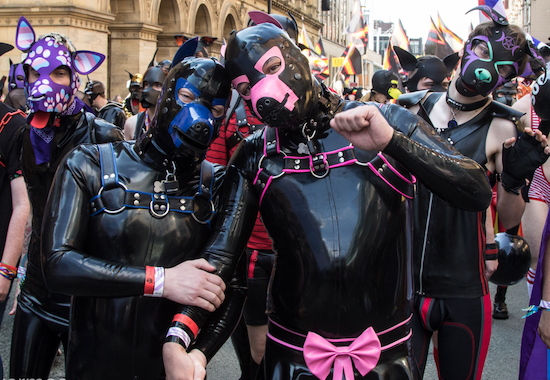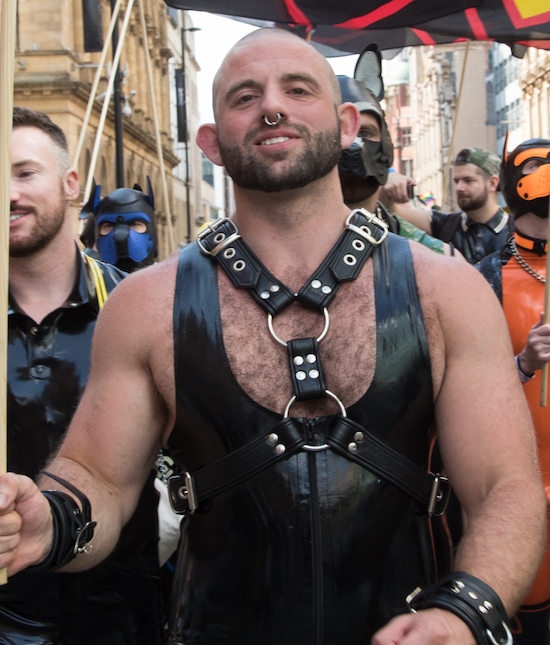It started, as all these things tend to these days, with a tweet written as a ‘reminder’ about Pride month. The first couple of bullet points were fairly obvious that few would disagree with: that Pride-supporting corporations and businesses were just after your money – like, duh. Lesbian exclusion is ugly – no argument there. However the final point appeared to tell people not to bring their kinks or fetishes to Pride because there are children present.
A cursory Twitter search for ‘Pride’ and ‘Kink’ throws up some interesting opinions. Lots of apparently-LGBT+ identifying young people have taken it on themselves to demand that kinks and fetishes have no place in the march. It’s nice of these members of the community to appoint themselves as moral guardians of a movement and celebration that had been going some years before they were even born. What would they prefer? A sanitised, cover-yourself-up-please solemn walk? I’m sorry, but do fuck off.
It often seems that a new generation forget that their own acceptance and the conditions that have allowed them to be the non-hetereo-identifying sexual being they are didn’t just happen overnight. After all, you’d not start a job and then walk in on your first day expecting the workplace to bend to your feelings. To benefit from all that the queer pioneers fought for decades ago and then feel you voice dictates what now occurs reeks of entitlement.
Pride means different things to different people. There are some who dismiss it, binfires who wonder when Straight Pride is happening, and there’s a lot of people for whom it means a great deal. It’s still only half a century ago that sex between two consenting men was decriminalised after all, in a society in which people were arrested or killed, humiliated and hung out to dry, cast aside as perverts and freaks even as the laws relaxed. Many still living bear the mental and literal scars of that time, and have lived to see the world change and gradually accept them.
The nature of fetish and kink allows you to become someone (or something) else, giving the freedom to let your freak flag fly and get ‘dressed for pleasure’. It has roots too in the signs and signifiers that allowed queer people to find each other in a time of oppression and prejudice. We saw it in the hanky code, where you could advertise what you were into, how you liked it and what you wanted in the world of casual sex. Obviously the key colours such as red (fisting), yellow (piss), dark blue (fucking) or white (versatile) were fairly obvious, but you could get niche and wear mosquito netting (outdoor sex), paisley (boxer shorts) and beige (rimming), and worn on either side to indicate whether you were a top or a bottom.
Without going too Soft Cell, homosexuals often lived secret lives. Having hidden themselves throughout the week, they’d let what hair they had down at the weekend. Often fetishwear allowed them to present a dominant, stern-looking stereotype at odds with their real selves. It’s coded, it’s select and secretive, yet made it simpler to approach someone else who was dressed in such a way that they seemed to be into your own interests.
When fetish clubs like The Block, Backstreet or The Hoist opened in London they became a refuge, even if you’d taken three buses or a couple of tubes with your outfits hidden under a tracksuit (although that’s become a fetish in itself, if you like a bit of rough). Once there, you were with your people, be they solicitors or bricklayers, their everyday norms stripped away into something more primal and sexual.

If someone wants to march with like-minded mates in harnesses and chaps, then bloody let them – this is part of the fabric of our movement. After all, in 2019 everything is up for grabs as regards a fetish – workwear, hi-viz clothing, suits, football socks, pup masks and lord knows what else. Kink should be part of our struggle as it always has been, symbolising how we’re different from the hetero norm – bringing this out of the secret clubs and specialist dating sites onto the streets is a quiet revolution. To police it and suggest that children and families will feel offended is as backward a step from our community on a par with those currently protesting outside schools against educating children in tolerance.
Whatever shade of gay you are – whether that’s wearing fairy wings on the back of a lorry or staying at home as the centre of town will be a nightmare – there’s really no need to turn on each other. If you want respect, remember that some people on their umpteenth march or regular attendance might like some too. Don’t tell someone in a leather harness that its unsuitable for children, don’t inform someone who has spent their younger years getting beaten up, bullied and living in fear, and who may have seen friends around them die, or destroyed by an uncaring system that’s barely got around to recognising them.
Our culture is built on people who didn’t give a fuck – Oscar Wilde, Quentin Crisp, Sylvester etc – people who added to culture by progressing and pushing it a little further. We have to fight enough as it is, let’s just respect one another a bit more. There are parts of the world where you could get thrown off a building for even the suspicion of being gay, or jailed and tortured in makeshift prison camps that would make Reading Gaol look like a five-star hotel. We’ve got it lucky and we should celebrate every day. Yet that luck, as we’re constantly reminded, could be rescinded at any moment. While there are dinosaurs like Ann Widdecombe and Esther McVey shilling for votes on the back of an outdated mode of ‘family values’ and queer couples getting beaten up on buses, politicised celebration is more important than ever. So if that guy from accounts wants to gimp up as an anonymous rubber drone, or that nice social worker wants to drag up as an East End gangster, then bloody let them. When we have cities that allow naked bike rides and Santa runs, or tolerate stag dos and hen weekends of borderline offensive ‘hilarious’ drag, coping with a march of men in harnesses is not a big deal. Lighten the fuck up, children. Together we’ve got power, apart we have pow-wow. There are bigger fights to be having.


